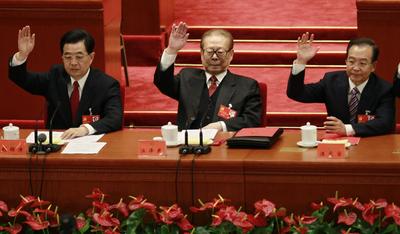But he will not hand over the premiership to his successor until the National Congress elections next year. After ten years in power, Mr Wen will be remembered by the Chinese people for three things: as a people’s prime minister, as a political reformist, and as a corruption fighter.
Wen has long been proclaimed ‘a people’s prime minister’. Chinese media often show images of him wearing simple clothes, holding a megaphone speaking to victims in disaster-hit areas or enjoying a meal with mine workers. Wen’s populist image makes him like other world leaders, such as Chile’s President Sebastian Pinera, who joined the crowd to congratulate trapped Chilean miners when they were rescued, or US President Barack Obama, who skipped campaigning in battleground states in the recent US election to visit New Jersey and talk to people affected by Hurricane Sandy. This behaviour is typical of political leaders who want to build a good image as leaders of the people, by the people and for the people, and demonstrate their duty to their constituents. All politicians do the same, although some do not know how to do it. Wen’s populism is different because it also has helped consolidate the image of the ruling CPC. Like its counterparts globally, the CPC is struggling to secure legitimacy in a world where movement toward democracy, the rule of law and freedom are on the rise.
Wen is also considered a political reformist because he explicitly said that political reforms must catch up with China’s economic reform and growth. Yet, political liberalisation is not what the CPC wants in the short term, so Wen’s call for political reform has been ignored or even censored in the state media.
On anti-corruption, Wen made an historic gesture, lodging a letter to the CPC Standing Politburo requesting an investigation of the riches his family was allegedly hiding. Hundreds of corruption cases, many linked to high-ranking officials of the CPC, are discovered and handled annually in China. Some of Wen’s colleagues in the Standing Politburo are reported by foreign media as using their influence to bring benefit to their family members, relatives and friends. Yet none have dared to act like Wen. Admittedly Wen’s move came after allegations that his family have profited from his position were raised in Western press, itself probably a fallout from the moves against Bo Xilai after the Chongqing scandal. Wen’s action was a courageous move nonetheless.
In China there are no institutions that guarantee democratic process or the rule of law. The CPC exercises control. This context begs the question about the significance of Wen’s request. Accountability is lacking in China. Representative governments can more readily hold their political leaders accountable to the people. Such systems do not exist in China. A top leader like Wen is only accountable to the party and subject to internal discipline. Exceptions only arise in cases where corruption serves a political rather than financial purpose.
What will be the outcome of the investigation and the CPC’s response? There are a number of possible scenarios. The first is that the allegations of hidden riches in Wen’s family are true. How would the CPC handle such a scandal? It is likely that the CPC would undertake internal procedures to protect the party and Wen. The public would be informed that the allegations were false and that Premier Wen was ‘clean’. Alternatively, the CPC might want to prove to the public that it upholds the rule of law by punishing, however lightly, some members in Wen’s family. They would likely deny Wen’s involvement. The most important thing as far as the CPC is concerned is that the good image of both the CPC and Premier Wen be protected.
Another scenario would see the allegations declared incorrect. This might happen regardless of the findings of the investigation. If the New York Times allegation were found to be incorrect this would protect the image of the CPC and Wen Jiabao. This would additionally allow Chinese authorities to criticise the Western media, who they say are out to blacken the reputation of Chinese leaders. In such a scenario Chinese authorities may introduce tougher policies toward Western media offices operating in China, reasoning that they have inappropriate motivations and interfere in China’s internal affairs like the Russian government’s allegations about USAID in Russia.
The CPC and its 5th generation of leadership under Xi Jinping are facing diminishing trust of leaders within the public. Wen’s call for his own scrutiny answers the call for increased accountability among the political leadership. Yet the findings from the investigation of his affairs are likely to lead to a predictable outcome, possibly even before Wen hands over the premiership to Li Keqiang next year. Wen’s legacy can help the CPC consolidate its legitimacy, although a breakthrough change is unlikely to take place soon in China.
Hai Hong Nguyen is a doctoral candidate at the School of Political Science and International Studies, the University of Queensland

